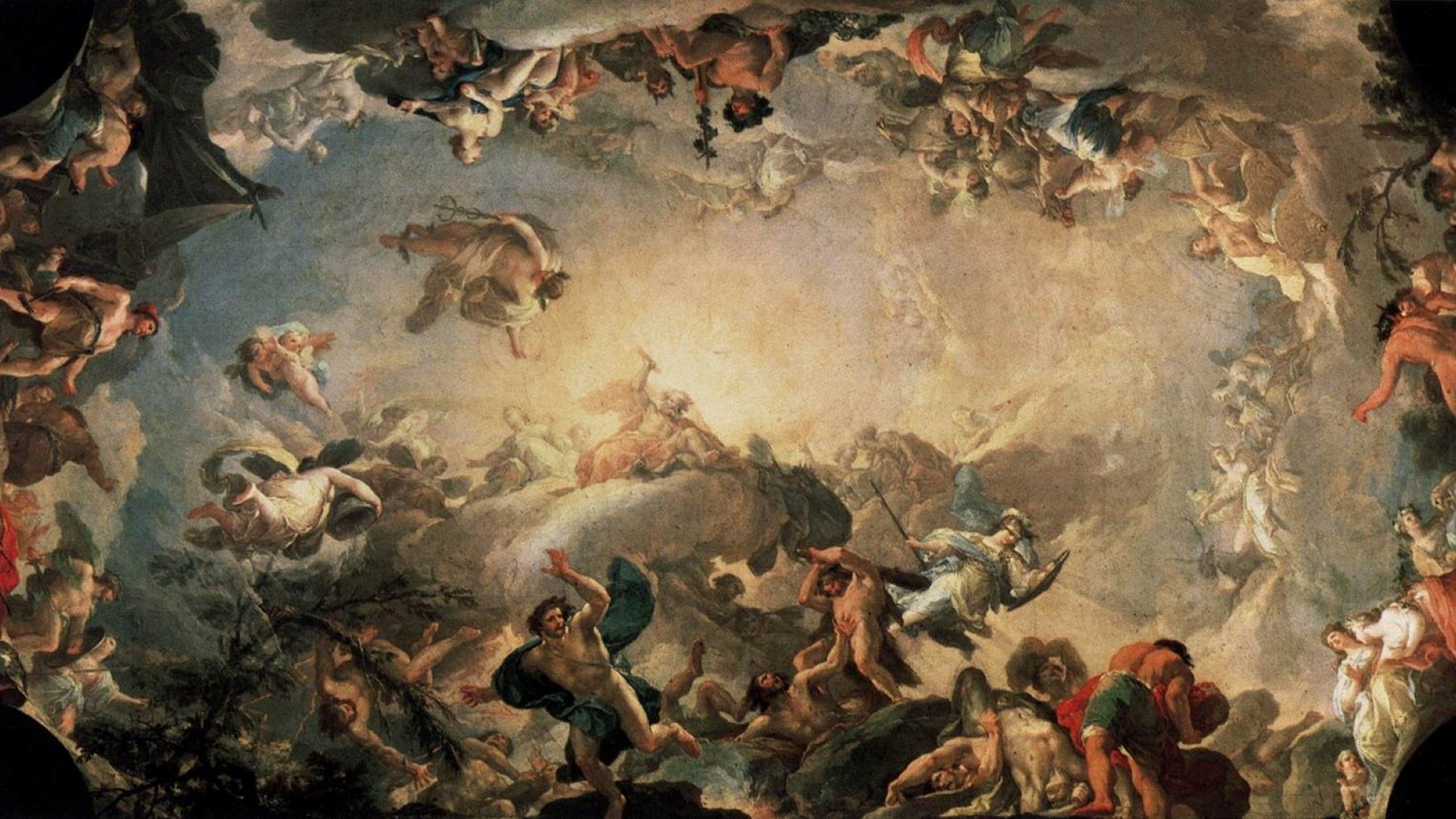
Priam
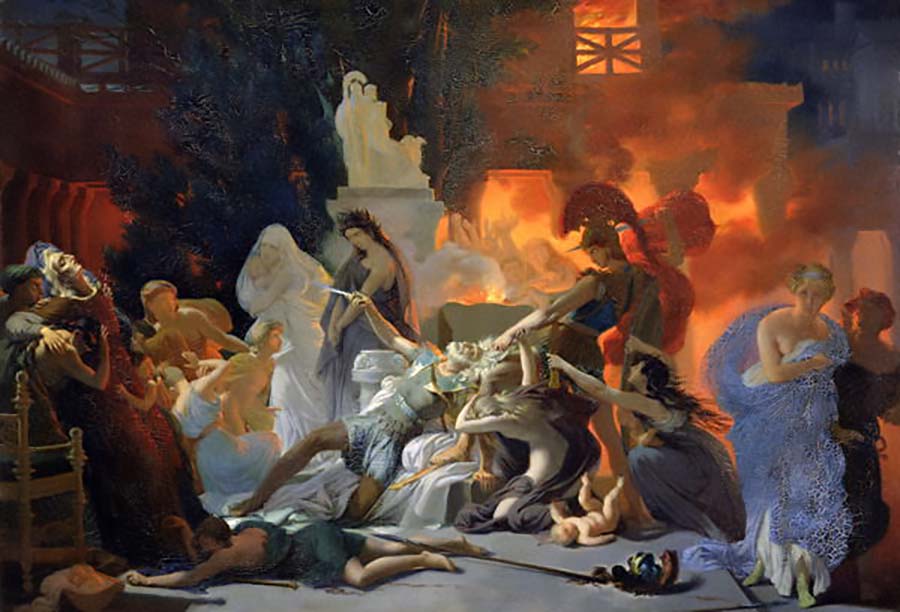
Priam was king of Troy when the Trojan War took place, and his fate was that of utter ruin for his country, his family, and himself.
"Of all the cities that men live under the sun and the starry sky, the nearest to my heart was Troy, with Priam and the people of Priam." (Zeus to Hera. Homer, Iliad 4.45).
"I have endured what no other mortal on the face of earth has yet endured, to reach forth my hand to the face of him that has slain my sons." (King Priam to Achilles. Homer, Iliad 24.505).
Heracles puts Priam on the throne
When Heracles came into conflict with King Laomedon of Troy, he attacked the city, and having taken it, he killed the king and all his sons, except little Podarces, later called Priam, because, as they say, Heracles was conquered by the child's tears. And instead of making a display of violence against a weak enemy, he chose to show mercy, and having decided to spare the life of the child, he told him:
"Take the reins and rule your state, sitting on your father's throne, but wield the sceptre with better faith." (Heracles to Priam. Seneca, Troades 718ff.).
The Palace of Priam
Priam ruled from a magnificent palace, which was fronted by marble colonnades. In the main building there were fifty apartments of polished stone, where his sons lived with their wives. His daughters occupied the chambers in the building on the other side of the courtyard, and there they lived with the sons-in-law of the king.
Fought the Amazons
Priam is said to have fought the Amazons together with Mygdon, king of the Bebrycians, and Otreus, king of the Phrygians. But during the Trojan War, the Amazons fought as Trojan allies against the invading Achaeans.
His two first sons with his second wife
Priam married first Arisbe, but he handed her over to the Phrygian Hyrtacus, and married a second wife Hecabe. Of this marriage Hector was born first, but when a second child was about to be born Hecabe dreamt she had brought forth a firebrand, which destroyed the city of Troy.
Aesacus, who could interpret dreams, said that the child was to become the ruin of his country, and advised to expose him. When the child was born, King Priam, following the prophecy, gave his son to a servant Agelaus in order to be exposed on Mount Ida, not far away from Troy.
However, the child, having being nursed five days by a bear, survived, and when Agelaus returned and found him safe, he carried the child away, called him Paris, and brought him up as his own son.
Prophecy fulfilled
The prophecy proved to be true, for Paris, having decided to get himself a wife from Hellas, sailed to Sparta and carried off lovely Helen from a warlike family. So, soon Priam and the Trojans found themselves besieged by a powerful army, determined to face no matter which calamities in order to have that woman restored.
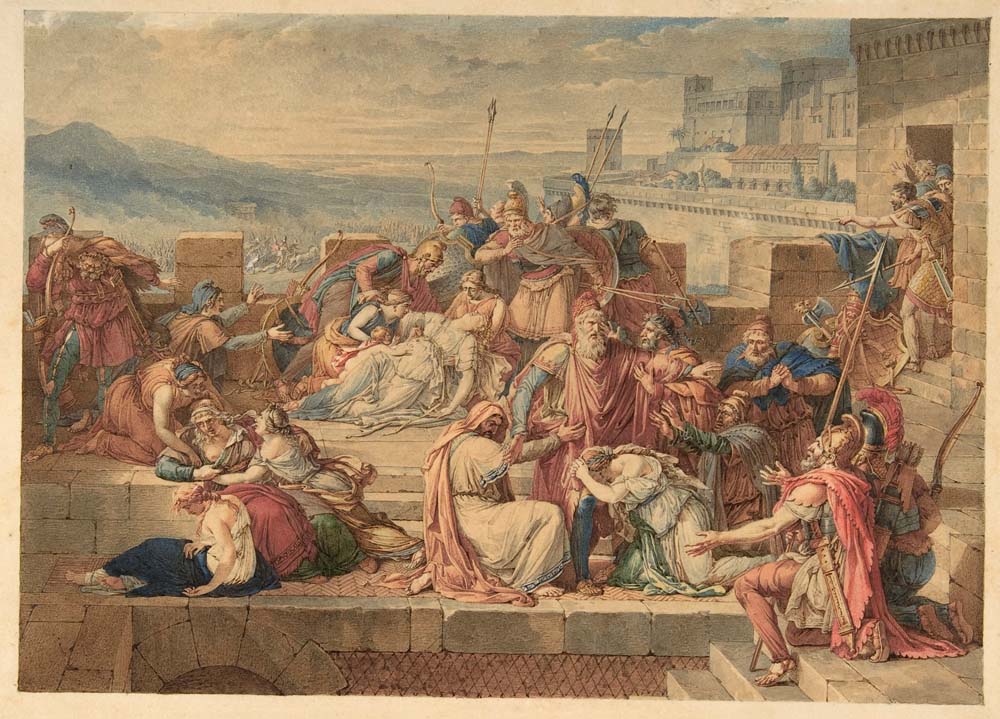
Was Helen ever at Troy?
Some have thought that there is no proportion between what is said to be the cause of this war, that is, the abduction of Helen, and the war itself, for they believe that such a huge event as the Trojan War is unlikely to be carried on to the end for the sake of a single woman.
For Priam, they argue, could not be so mad as to agree to risk his house, people, and city so that Paris could sleep with Helen, nor Hector, who was the crown prince, could have allowed that folly. So they find more reasonable to believe that the war occurred because of a woman that was not at Troy, and not because of a woman that was there.
And they proceed to say that the Trojans did not have Helen, and could not therefore give her back, but the Achaeans, disbelieving the Trojans, kept on fighting, and although they finally conquered the city, they could not find Helen at Troy. This is what they say they learned about the Trojan War through wise Egyptian priests, who affirmed that while the Achaeans and Trojans fought each other at Troy and perished, Helen and the property were safe in Egypt.
For more click here: "Eidolons"
Helen's beauty adorned the city
But others have no doubt about Helen being at Troy. They even say that the Elders of the city, who the worst they fought the best they spoke, talked about her with admiration, praising her beauty and considering her a jewel, worth to possess:
"Who could blame the Trojans and Achaeans for suffering so long for such a woman's sake? Indeed she is the very image of an immortal goddess." (Elders of Troy. Homer, Iliad 3.155).
And yet they could also come to their senses and add:
"All the same, and lovely as she is, let her sail home and not stay here to vex us and our children after us." (Elders of Troy. Homer, Iliad 3.160).
King Priam himself did not find her presence too embarrassing:
"Dear child, come here and sit in front of me ... I bear you no ill will at all: I blame the gods." (Priam to Helen. Homer, Iliad 3.162).
Priam does not oppose Paris
Later, when the Elder Antenor demanded in a Trojan council that Helen and the property be restored, and Paris answered that of both he would only restore the property, firmly declaring that he would not give Helen back, Priam intervened, and far from putting pressure on his son, he recommended that Paris' offer should be proposed to the Achaeans, a proposal that was well received by the council, which acted on it. But the Achaeans, who by then had understood that the Trojans' doom was sealed, rejected the agreement.
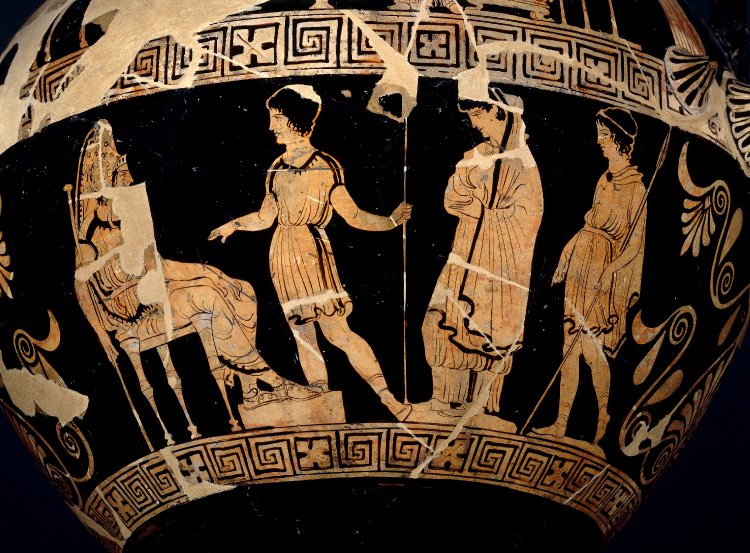
As the end approaches Priam tries to influence the course of events
It is not before Hector declared that he would meet Achilles in single combat, that Priam made a serious effort to change the course of events. For Hector was the pillar of Troy's defence besides being his son, and if he fell everything else would follow in the fall. That is why he says:
"I beg you, my dear son, no to stand up against Achilles alone and unsupported ... He is far stronger than you ... So come inside the walls, my child, to be the saviour of Troy and the Trojans ... Have pity too on me, your poor father ... Think of the horrors I shall have to see before I die, the massacre of my sons, my daughters abused, their bedrooms pillaged, their babies dashed on the ground ... and I shall be torn to pieces by dogs at my own street door." (Priam to his son Hector. Homer, Iliad 22.40ff.).
But neither his words nor his wife's could change the resolution of the stubborn son.
Priam grovels in the dung
When Achilles killed Hector, he inflicted the most shameful outrages to the dead man's body in front of the Trojan walls. As Priam saw what was happening he was overwhelmed by anguish, and made an attempt to leave the city through the Dardanian Gate. His people finally stopped him but he, grovelling in the dung and weeping, implored them to let him go to the ships, and beg for the body of his son to the inhuman monster that was outraging it.
That was just the beginning, for Achilles, who did not know of other ways to calm his anger for the death of his dear friend Patroclus, planned to put to the sword twelve Trojan prisoners, and let them burn in the funeral pyre of Patroclus, which he also did. But the body of Hector he intended to give to the dogs to eat. However, Aphrodite protected the corpse of Hector, anointing it with ambrosia, and the dogs did not approach, and when Achilles dragged the body with his chariot round Patroclus's grave, Apollo saved the flesh from destruction.
In this way Achilles treated the body during twelve days. So seeing that there were no limits for Achilles' wrath, Zeus decided that the angry man should accept a ransom from King Priam, and give the body of Hector up. For that purpose, Zeus sent Thetis to calm Achilles, and Iris with a message for Priam, instructing him to come to the ships, and with the help of gifts, persuade Achilles.
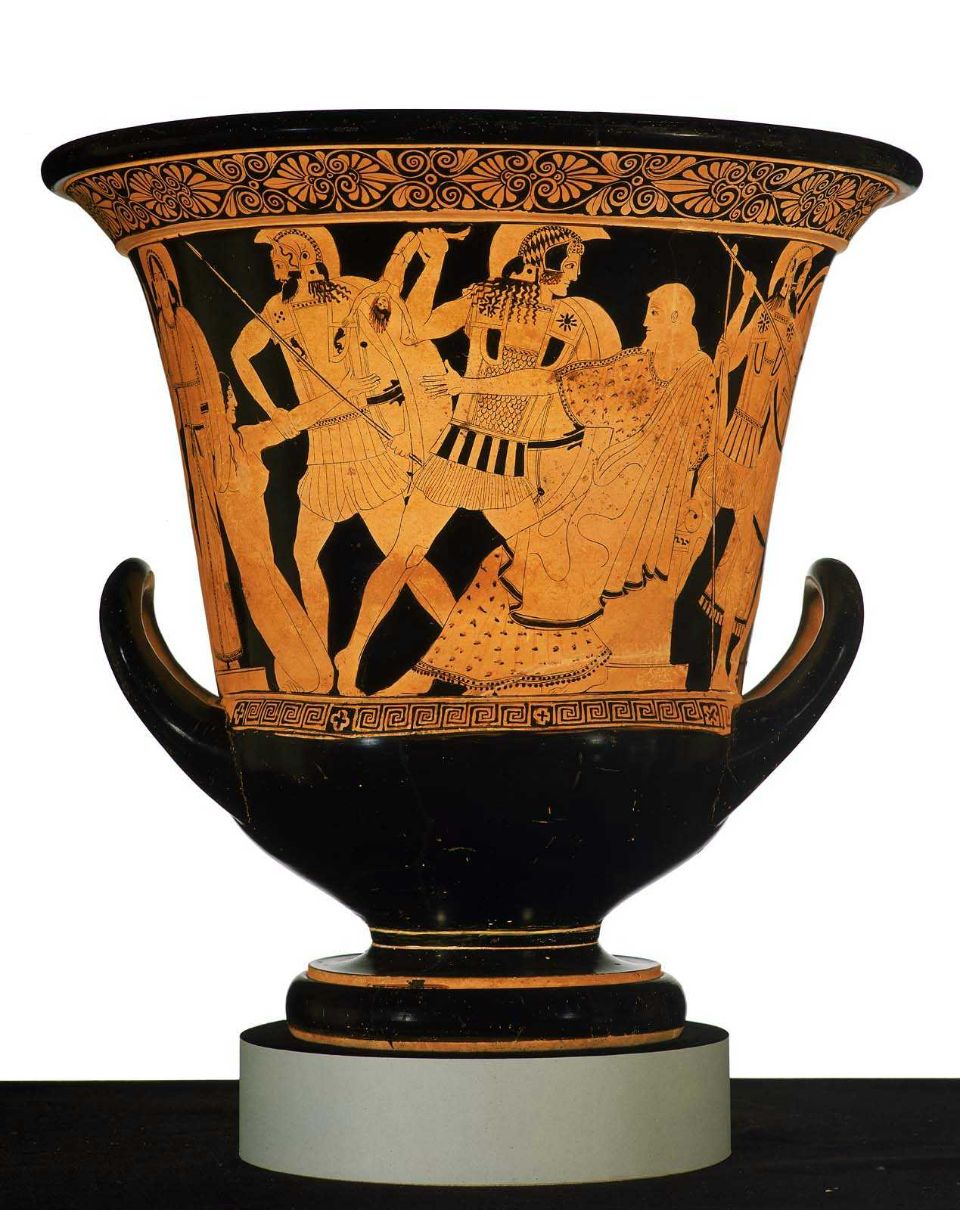
The bitterness of Priam falls upon his sons
That is how Priam left Troy and went to see Achilles, carrying twelve robes, twelve cloaks, twelve sheets, twelve mantles, twelve tunics, and besides bringing gold, tripods, cauldrons, and a Thracian cup, at a time when he most of all wished to die. For no other son he loved so much as Hector, and that is why, while leaving for the ships to meet Achilles, this bitter father told them:
"My good-for-nothing and inglorious sons! I only wish you had all been killed instead of Hector." (Priam to several of his sons. Homer, Iliad 24.250).
And so, hoping to be received by Achilles with kindness and compassion, he left the city.
Priam ransoms the body of Hector
Achilles had already made his mind since Thetis had persuaded him to let his wrath aside, so Priam was able, after this delicate meeting, to ransom the corpse. But in all details he was forced to do as he was told, including to dine with the killer of his son. When they parted a truce of twelve days was agreed between Achilles and Priam for the funeral of Hector.
Death at last
When later Troy was taken, Achilles' son Neoptolemus looked for Priam, who tired of witnessing so much ruin and death, longed himself to die. So on seeing Neoptolemus approaching the altar of Zeus where he had taken refuge he said:
"Son of Achilles, slay me, and pity not my misery. I have no will to see the sun's light more." (Priam to Neoptolemus. Quintus Smyrnaeus, The Fall of Troy 13.225).
And Neoptolemus, dragging him out of the temple, slew him at the gate of his own palace. With the death of Priam also his house was extinguished, but some have said that little Astyanax, son of Hector and Priam's grandson, survived and years later became king of Scepsis, a place not far away from Troy.
Namesake
Priam is a companion of the exiled Aeneas.
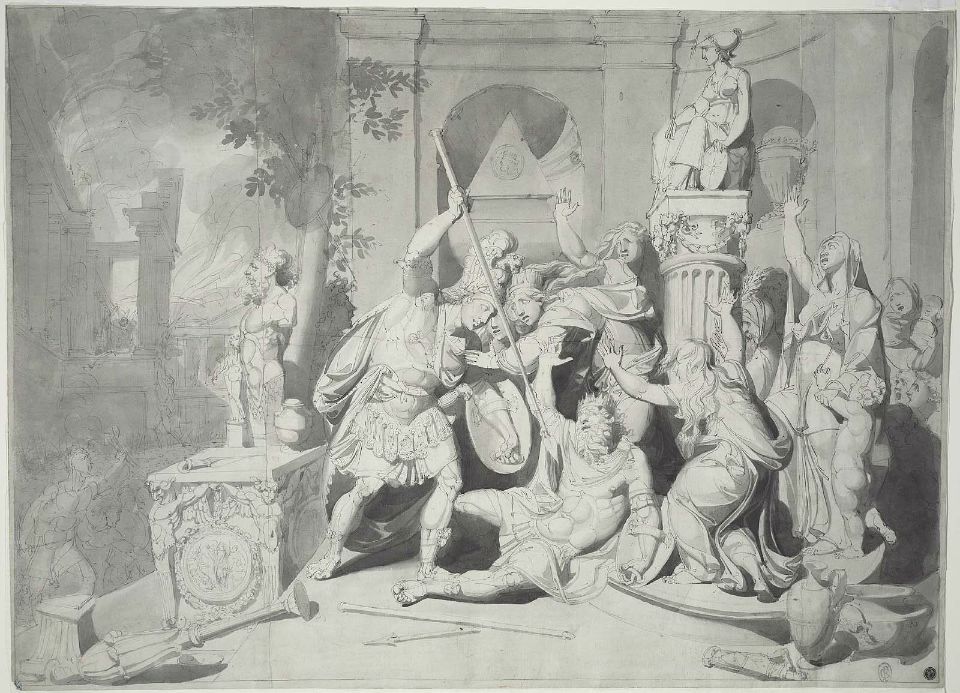
The Children of Priam
King Priam was the last and most famous of all Kings of Troy; a descendant of Dardanus, Priam was placed on the throne of Troy by Heracles, and would remain king until the destruction of the city by the Achaean forces.
King Priam though is arguably more famous for his own children than for any act or deed during the Trojan War; and indeed the children of King Priam number amongst the most famous individuals of Greek mythology.
The One Hundred Children of Priam
It is not surprising that many of the children of King Priam would become famous, for they were numerous in number, as many as 100, and most were adults during the Trojan War.
The number of 100 children comes from the Homeric tradition which said the King of Troy had 50 sons and an equal number of daughters, although it is difficult to get a definitive list of the names of these children; and other sources tell of perhaps as few as 51 children for Priam.
The Wives and Lovers of Priam
The mothers of the children are not always clear either. It was said that King Priam was married twice, first to Arisbe, the daughter of the seer Merops, and secondly to Hecabe (Hecuba) the daughter of King Dymas. Arisbe though was said to have born Priam only one son (Aesacus) and Hecabe only 14 (or 19) children.
Priam though was said to have had many concubines and mistresses, including Laothoe, daughter of King Altes, and Castianeira of Aesyme.
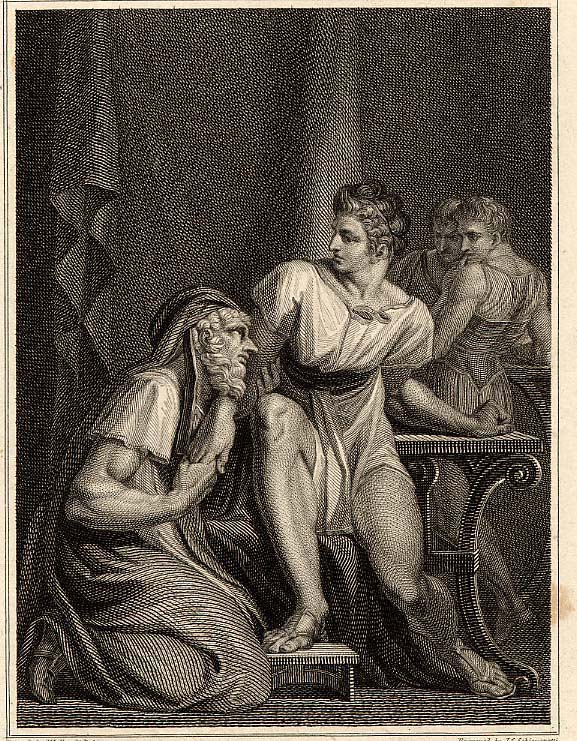
The Famous Sons of King Priam
Aesacus (by Arisbe) – noted seer, having learnt from his grandfather Merops, who told of the destruction of Troy when his half-brother Paris was born. Aesacus was transformed into a diving bird before the Trojan War when his wife, Asterope, died.
Anitphus – (by Hecabe) – captured by Achilles, but subsequently ransomed, then later killed by Agamemnon’s sword.
Deiphobus (by Hecabe) – noted defender of Troy, married to an unhappy Helen after death of Paris, killed by Menelaus during the Sack of Troy.
Gorgythion (by Castianeira) – “beautiful” and “blameless” son of Priam, killed by Teucer’s arrow as he stood by his half-brother Hector.
Hector – (by Hecabe) – heir to the throne of Troy, and the most prominent of the warriors to defend Troy, acknowledged as the hero the Achaeans would have to overcome to triumph. Hector was the husband of Andromache and father of Astyanax. Killed by Achilles.
Helenus – (by Hecabe) – noted seer, twin brother of Cassandra, and though a one-time defender of Troy would leave the city, and subsequently aided the Achaeans. Survived the Trojan War and became a king of Epirus.
Hipponous – (by Hecabe) – defender of Troy, and last Trojan killed by Achilles.
Pammon - (by Hecabe) – defender of Troy. Killed by Neoptolemus.
Paris – (by Hecabe) - aka Alexander – prince noted initially for his sound rulings, hence the Judgement of Paris, but then abducted Helen. Killed by Philoctetes.
Polites - (by Hecabe) – defender of Troy. Killed by Neoptolemus.
Polydorus - (by Hecabe) – the youngest son of Priam, given to Polymestor to look after during Trojan War, but treacherously killed by his guardian.
Troilus (by Hecabe) – a beautiful youth, potentially a son of Apollo rather than Priam. According to a prophecy, Troilus had to die before adulthood if the Achaeans were to take Troy, and so Achilles ambushed and killed Troilus.
The Famous Daughters of King Priam
Cassandra – (by Hecabe) – twin sister of Helenus, and also a seer, but destined never to be believed. Warned Trojans of the Wooden Horse, but ignored. After the war, became concubine of Agamemnon, and subsequently killed by Clytemnestra and Aegisthus.
Creusa (by Hecabe) – first wife of Aeneas and mother of Ascanius, died during the Sack of Troy.
Iliona (by Hecabe) – oldest daughter and wife of King Polymestor, thus Queen of Thracian Chersonesus and mother of Deipylus.
Laodice (by Hecabe) – wife of Helicaon, and most beautiful of all Priam’s daughters; potentially mother of Munitus by Acamas. Died during Sack of Troy when chasm opened up and swallowed her.
Polyxena (by Hecabe) – potential cause of Achilles death, if Achilles was killed in ambush, for some tell of Achilles having fallen in love with Polyxena. Polyxena, after fall of Troy, was slaughtered on Achilles grave to allow fair winds for the Achaeans to sail home.
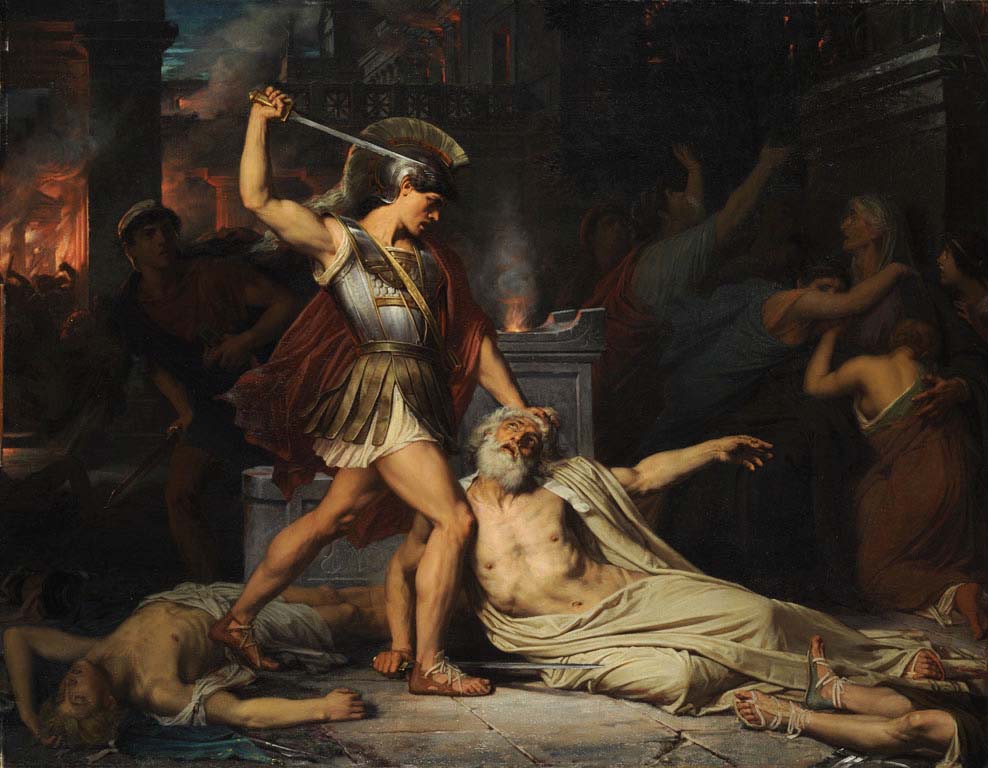
Other Children of Priam
Aegeoneus
Agathon
Antinous
Antiphonus – killed by Neoptolemus
Archemachus
Aretus – killed by Automdeon
Aristodeme
Aristomache – wife of Critolaus, daughter-in-law of Hicetaon
Ascanius
Astygonus
Astynomus
Atas
Axion – killed by Eurypylus
Biantes
Bias – father of Laogonous and Dardanus (both killed by Achilles)
Brissonius
Cebriones – charioteer of Hector after Archeptolemus – killed by Patroclus
Chaon
Chersidamas – killed by Odysseus
Chriodamas
Chromius – killed by Diomedes
Chrysolaus
Clonius
Deiopites- killed by Meges
Demnosia –
Democoon – killed by Odysseus
Demosthea
Dius
Dolon
Doryclus – killed by Ajax the Great
Dryops – killed by Achilles
Echemmon – killed by Diomedes
Echerphron
Eresus
Ethionome
Evagoras
Evander
Glaucus
Henicea
Hero
Hippasus
Hippodamas – killed by Achilles
Hipposidus
Hippothous
Hyperion
Hyperochus
Idomeneus
Ilagus
Isus – bastard son, driver of Antiphus’ chariot, killed by Agamemnon
Laodocus
Lycaon (by Laothoe) – captured by Achilles and sold to King Euneus of Lemnos. Subsequently ransomed, but then captured by Achilles again, and then executed by Achilles.
Lysianassa
Lysides
Lysimache
Lysithous
Medesicaste – married to Imbrius, son of Mentor
Medusa
Melanippus – killed by Teucer
Mestor – killed by Achilles
Mylilus
Nereis
Palaemon
Phegea
Philaemon
Philomela
Polymedon
Polymelus
Proneus
Protodamas
Telestas
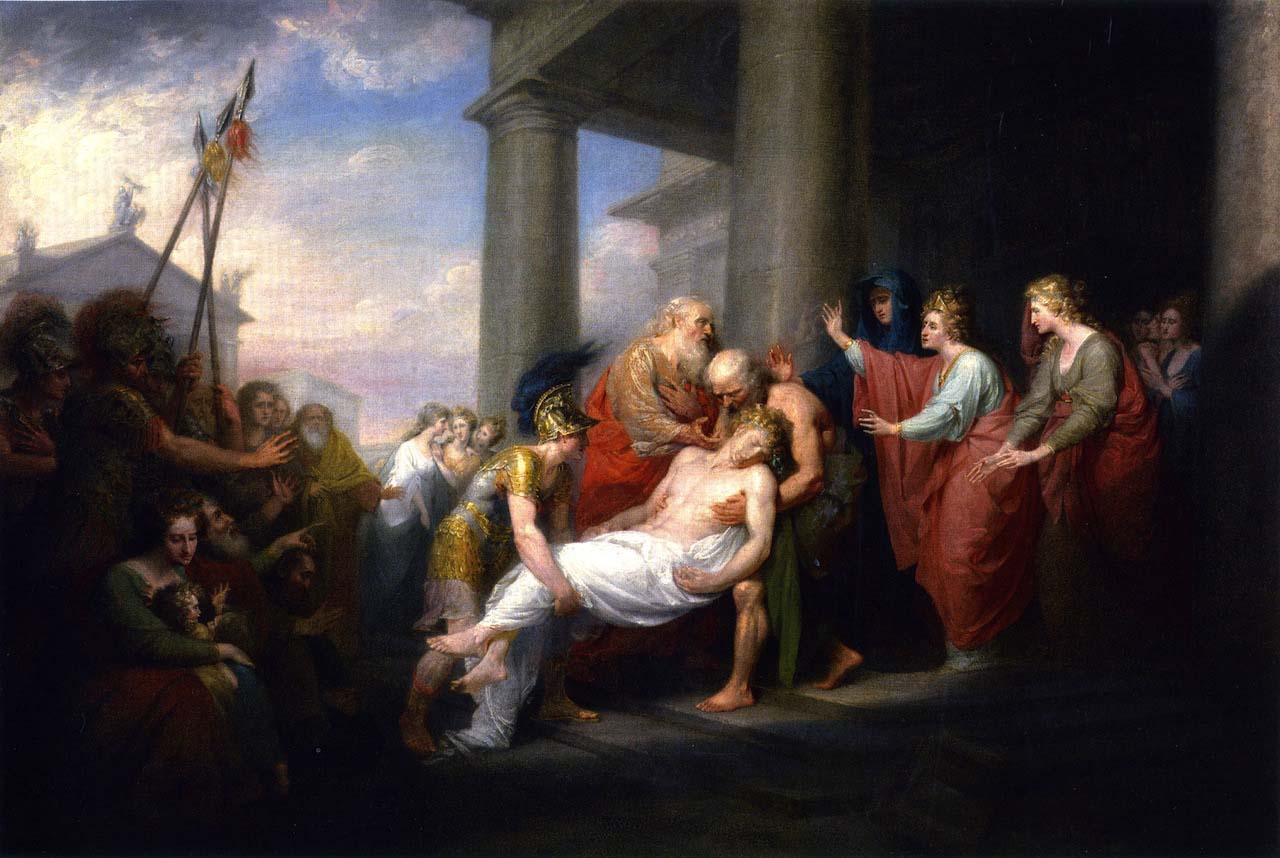
Sources
Homer, Iliad,
Pseudo-Apollodorus, Bibliotheca 3.12.5
Hyginus, Fabulae 90
Photius, Bibliotheca 190.37
Publius Vergilius Maro, Aeneid
Pausanias, Graeciae Descriptio. 3 vols.
Seneca, Troades 718ff
"Greek Mythology Link"
Our Mobile Application
Check out Our Mobile Application "Ancient Greece Reloaded"


